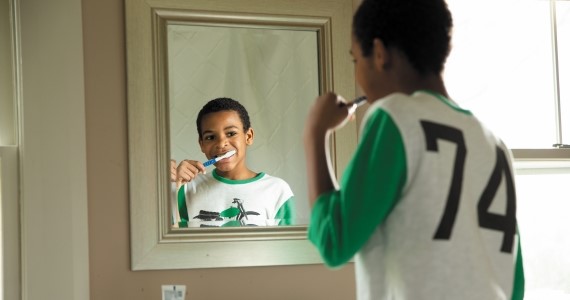Water Conservation While Brushing
Conserve water by turning off the faucet when brushing your teeth

Fun Facts About Water
Since humans, animals, and many living organisms on Earth need water to survive, and as there is a limited supply, water conservation is important. By conserving water, we are protecting the environment, being responsible, and using our water supply wisely. Did you know:
- About 71% of the Earth is made up of water
- 97.5% of Earth's water is salt water (ocean, seas, and bays)
- 2.5% of the Earth's water is fresh water (lakes, ice caps, glaciers, and ground water)
- Most of the fresh water is trapped in ice caps, glaciers, or permanent snow
- Only a little over 1.2% of all fresh water is available to support the needs of life on Earth
- Humans get a large portion of their water from rivers
- Depending on conditions, the maximum time an individual can go without water is about a week
- A person in the US uses about 50 gallons of water a day
Conserve Water While Brushing Your Teeth
The American Dental Association recommends brushing your teeth for two minutes. Many people leave the faucet on while brushing their teeth without noticing it. This wastes up to 4 gallons of water each time we brush our teeth and hurts our ecosystem at the same time. The most effective ways of saving and conserving water when brushing your teeth is:
- Drip a few drops of water to dampen your tooth brush
- Turn off the faucet when you're brushing your teeth
- Rinse your mouth with a reusable cup
Not only are you saving the environment when the faucet is turned off, you're also saving money!
Other Ways to Conserve Water
Failing to conserve water can lead to an increased water bill, water shortage, and health risks to many of Earth's living creatures. The following are additional ways to conserve water at home:
- Fix leaks as soon as possible
- Avoid long showers
- Run full loads of dishes and clothes when using the dishwasher or washing machine
- Run the sprinklers in the morning to prevent rapid evaporation
With mindful changes, we can leave a healthy environment for our children and save some money in the meantime.






